2022
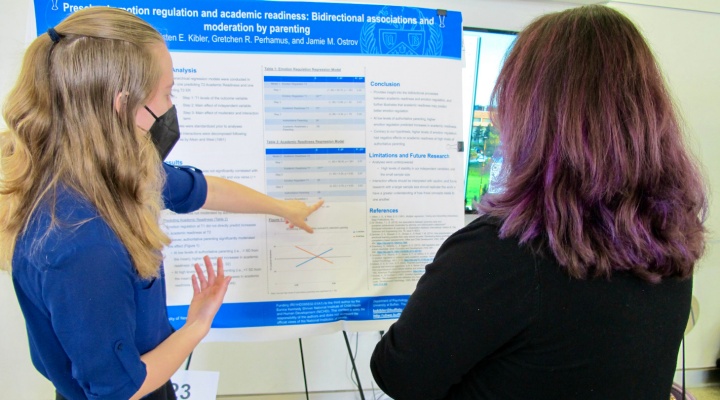
Psi Chi Officer Kristen Kibler presenting her poster to a faculty judge at the 3rd annual Western New York Undergraduate Psychology Conference.
In this Issue:
Support your Department
Dear UB Psychology Friends,
It’s been a beautiful fall season in Western New York, and it’s hard to believe that it’s time to start thinking about winter, the end of the semester, and the holidays. The campus continues to reawaken post-pandemic, with more and more activities coming back in person. It is exciting to come together as a community again. As we close out 2022, we are delighted to share some of the Department’s past successes and future hopes here in this newsletter.
In the classroom, through experiential learning opportunities such as working in research labs, and through involvement in clubs and activities, and pursuing independent Honors projects, our more than 1500 undergraduate Psychology majors are gaining important experience in the field. We are especially excited that our UB chapter of Psi Chi, the international Honor Society in Psychology, inducted 73 new students into the society. The UB Psi Chi society’s outstanding work was also recognized as a “Model Chapter” from the Psi Chi Board of Directors. You can read more about this recognition, and some of the other things our undergraduates have been doing, in this newsletter. I also highly recommend the piece by our own Tim Pruitt, who talks about the promise and pitfalls of online learning!
Our department’s Masters and Doctoral are crucial to the Department’s mission, and we are honored to mentor them, and support their professional development. These graduate students are active in research in faculty labs, publishing papers, presenting at conferences, and winning awards. Please read more in this newsletter about some of our graduate students’ outstanding achievements this past year.
The COVID-19 pandemic has highlighted how structural inequities can undermine mental and physical health, creating stark disparities across racial, sexual, and ethnic minorities. Here in our department, we are more committed than ever to our work that seeks to understand the factors that contribute to mental health and wellness, and to addressing health inequities. In the spring of 2022, the Department of Psychology received a Disciplinary Excellence Investment from UB’s Provost that recognizes our department’s commitment to addressing mental health disparities as they occur across the lifespan. This investment includes three new hires for Psychology, all focused on faculty who do mental health equity research. The investment also will provide some funds for building infrastructure to support our efforts. This is an exciting time, and we are looking forward to building our department in ways that will help us to find solutions to some of the challenges we face in the 21st century. You can learn more about some of the many interesting projects going on in our department in our Research Highlights.
Also in this newsletter is more about Psychology Department’s participation in UB’s VITAL scholar program. This program brings early career faculty from historically underrepresented backgrounds to UB’s campus to share their research and to forge connections for the future. Our department hosted four scholars, who visited us for nearly a week, meeting with faculty, touring the city, and discussing research and career plans.
I hope that you enjoy reading more about our department’s activities and our plans for 2023. I thank you for your past generous donations. Your support allows us to expand and move forward in new and meaningful ways. We are grateful for the opportunity to build our department with your help.
In closing, I wish you a very happy and healthy holiday season. We look forward to connecting with you more in the New Year.
Best,
Jen Read
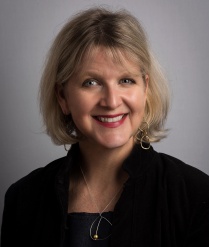
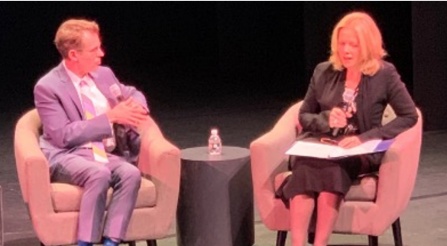
Peter Pfordresher talking with opera singer Renée Fleming during a panel discussion.
Something a little different
Peter Pfordresher, associate dean for academic affairs and professor of psychology participated in a panel discussion as part of Music and the Mind in June. The event was a panel discussion featuring Renée Fleming, JoAnn Falletta, Music Director of the Buffalo Philharmonic Orchestra and Dean of the College, Dean Robin Schulze, in conversation with scientists, practitioners and musicians working at the intersection of music, neuroscience and healthcare.
Hispanic couples coping with COVID-19
The Reischer lab found that couple’s relationships are more likely to thrive when their stories about coping with COVID-19 highlight feelings of control and positive regard for their families.
Cannabis may reduce opioids for cancer pain
The Ashare lab is studying whether patients with cancer may use cannabis to manage pain and potentially reduce opioid use. The insights gained could inform guidelines for cannabis use in cancer pain and symptom management.
Money isn’t everything
The Park Lab finds that people who base their self-worth on financial success report more work-family conflict and struggle with burnout at home and at work.
Extra alone time?
Recent research out of the Bowker lab suggests that young people find social interactions more enjoyable on days when they seek solitude or some time alone, unless they are seeking time alone to escape stressful social situations.
Going to a rock concert?
The Dent lab found age differences in how mice recover from the type of noise exposure humans attending loud concerts might experience. Older mice showed more damage and had less recovery in their hearing over time than their younger counterparts.
The Department of Psychology was excited to host 4 VITAL scholars for a week in October 2022. The Visiting Future Faculty (VITAL) program brings advanced trainees from historically underrepresented backgrounds to UB’s campus. The scholars who visited our department met with students, faculty, and staff, and shared their research in several departmental colloquia. Mariela Faykoo-Martinez (University of Toronto) gave a talk describing the endocrine and genomic factors associated with pubertal suppression in naked mole rats. Juan Hernández (University of Arizona) discussed how acculturation impacts dietary habits, including disordered eating, among Mexican American youth. Termara Parker (Yale University) described insights gained from using neuroimaging methods to examine the social behavior of people with autism spectrum disorders. And Alberto Valido (University of North Carolina, Chapel Hill) talked about individual, social, and societal impacts on the mental health of LGBTQ+ people of color. In addition to sharing their research with us, the visiting scholars also attended professional development sessions with scholars visiting other departments, received academic mentorship, and explored UB and the city Buffalo. We are looking forward to welcoming a new cohort of visitors next fall!

Professor Tim Pruitt’s Reflections on Teaching in an Online Era
Love it or hate it, online instruction is here to stay, and the traditional zeitgeist of higher education has forever changed. Prior to the COVID-19 pandemic, online education was rapidly growing as it provided colleges means to reach beyond regional populations, flexibility for students with jobs and families, and accessible training opportunities for companies. However, moving forward, instruction in and outside of the classroom will be routine for those seeking more traditional college experiences as well.
A new favorite tool of mine is a social annotation application named Hypothesis, which allows users to collectively mark up and post comments on PDF and web documents. This creates a space for shared knowledge construction, which affords students great flexibility in how they express ideas and make connections. For instance, in advanced classes, students can clarify their understanding of journal articles through peer-to-peer information sharing. Likewise, critical analyses or insights can be easily communicated among students and remain readily available for reference by others. Excitingly, the Hypothesis platform provides a unique way for students to creatively engage in the course material while socially interacting with their peers and instructors outside of the classroom context.
Psi Chi
The UB chapter of Psi Chi, the International Honor Society in Psychology, inducted 73 new inductees during the 2021-22 academic year! Our chapter was also thrilled to receive a Model Chapter Award from the Psi Chi Board of Directors and the Central Office. In 2021-22, only 31 chapters received this award out of nearly 1200 chapters around the globe. This places UB’s Psi Chi chapter in the top 3% of all United States and international chapters!
As usual, the chapter stayed busy hosting a variety of events for undergraduate psychology students including the semesterly research fair, destress events, game nights, food and book drives, and talks about graduate school. The chapter’s student officers and junior officers even spent a night together volunteering at Friends of Night People, a local charity and soup kitchen. The biggest event of the year was when the chapter hosted the 3rd annual Western New York (WNY) Undergraduate Psychology Conference, a regional conference founded by the chapter’s faculty advisor Dr. Joyce Lacy. Over 120 students, faculty, and guests from 7 different institutions across WNY attended in person this year!
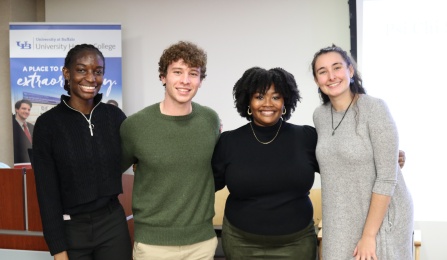
Psi Chi officersat the 2021 Fall Induction Ceremony. From left to right, Community Service Coordinator Chantel Fatorma, Secretary Matthew Negersmith, President Jasmine Greggs, Vice President Ashlan Hubbard, [not pictured] Social Media Voice/Graphic Designer Kristen Kibler.
3rd annual Western New York Undergraduate Psychology Conference
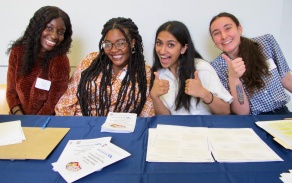
Chantel Fatorma, Jasmine Greggs, Pooja Nattu, and Ashlan Hubbard
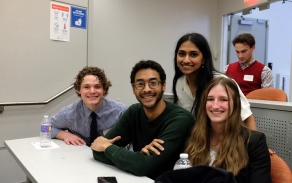
Connor Carrow, Gabriel Santos, Pooja Nattu, and Leah Heiler
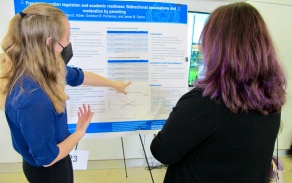
Psi Chi Officer Kristen Kibler presenting her poster to a faculty judge.
Our Recent Honorees
The generous gifts of alumni and department friends allow us to honor the scholarly contributions of our accomplished undergraduate and graduate students.
Destiny Brakey is the 2022 recipient of the Bugelski Dissertation Award. The financial award honors excellence in scholarly productivity during doctoral studies and the significance and quality of the doctoral dissertation project. Destiny received this award for her dissertation research identifying brain regions that help regulate drinking in Brattleboro rats. This award is supported by an endowment in the honor of Dr. B. R. Bugelski, a UB Distinguished Professor of Psychology and Chair of our department in the 1960s. Dr. Bugelski was best known for the advancement of the concept of "secondary reinforcement," an idea that has become a core concept in learning theory and appears in many psychology textbooks.
Jordan Johnson is the 2022 recipient of the Feldman-Cohen Award. Named in honor of two distinguished former faculty, the $500 monetary award is given to the undergraduate whose Honors Thesis receives the highest ranking by the student’s examination committee, faculty advisor, and the Director of the Honors Program. Jordan's thesis, supervised by Dr. Matthew Paul, investigated the role of estradiol in exploratory behavior in juvenile hamsters.
Allison Scagel is the 2022 recipient of the Robert W. Rice Memorial Award for Early Excellence in Research. Dr. Rice joined the UB Psychology department in 1976 and furthered his research examining quality of work and family life. The $1200 monetary award in his name honors distinguished early career research contributions by a junior graduate student. Allison received this award for her 2022 paper “Do that again! Memory for self-performed actions in dogs (Canis familiaris)” published in the Journal of Comparative Psychology.
Gretchen Perhamus and Jasmine Greggs are the 2022 graduate and undergraduate recipients of the Murray Levine Award for Community Engagement in Psychology. Dr. Murray Levine was a SUNY Distinguished Service Professor and a member of the UB Psychology Department from 1968 until 2000. Murray was among a core group of influential psychologists who helped launch the field of community psychology. This award recognizes original research poised to make a significant impact on the community surrounding UB and is sponsored by the generous support of Dr. Robert Fink, a UB alumnus and one of Murray’s former students.
Gretchen Perhamus was honored for her paper titled “Inhibitory Control in Early Childhood Aggression Subtypes: Mediation by Irritability” published in 2021 in Child Psychiatry and Human Development. Gretchen’s basic research in child care centers throughout the Buffalo area identified important mechanisms that promote or impede the development of critical self-regulation skills. She is working towards translating these findings into effective school-based intervention to help teachers “coach” children to increase their capacity for self-regulation.
Jasmine Greggs was honored for her dedicated service to the Psychology Department. Jasmine is completing a BS in Psychology with a minor in Global Gender Studies. She is a Daniel Acker Scholar and served as an undergraduate teaching assistant for the Psychology and Biological Sciences Departments. Jasmine also served as President of UB's chapter of Psi Chi, The International Honor Society in Psychology. She conducted research in Dr. Matthew Paul's Behavioral Neuroendocrinology Lab and is completing a Psychology Honors Thesis under his supervision.
Notable contributions to UB?
We are so proud of our alumni. Please let us know if you would be to considered for an award recognizing your distinguished contributions, work, and service to UB!
Thank you for your support of the Department of Psychology. With the support of alumni and friends, we can provide vital resources to enhance our department and provide support for students, research projects and programs. We are grateful for your generosity.
You can support your department and help to provide for our students by making a gift online.